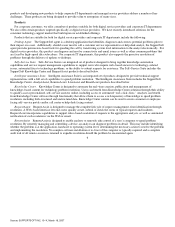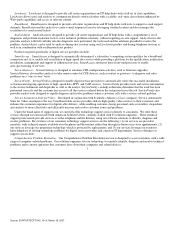Support.com 2006 Annual Report Download - page 20
Download and view the complete annual report
Please find page 20 of the 2006 Support.com annual report below. You can navigate through the pages in the report by either clicking on the pages listed below, or by using the keyword search tool below to find specific information within the annual report.
customer order. Additionally, we may not obtain new customers. The failure to obtain significant new customers, particularly
customers that purchase perpetual licenses with up−front payments, the loss or delay of significant customer orders or the failure of
existing customers to pay ongoing fees when due would harm our operating results.
Our sales cycle is lengthy and if revenue forecasted for a particular quarter is not realized in that quarter, significant expenses
incurred may not be offset by corresponding revenue.
Our sales cycle for our software typically ranges from three to nine months or more and may vary substantially from customer to
customer. The purchase of our products and services for corporate customers generally involves a significant commitment of capital
and other resources by a customer. This commitment often requires significant technical review, assessment of competitive products
and approval at a number of management levels within a customer’s organization. In addition, in the wake of the Sarbanes−Oxley Act
of 2002, companies have enhanced their approval processes, making sales more difficult or protracted. While our customers are
evaluating our products and services, we may incur substantial sales and marketing expenses and spend significant management effort
to complete these sales. Any delay in completing sales in a particular quarter or the failure to complete a sale after expending
resources during the sales cycle could cause our operating results to suffer.
Our recently announced consumer technology support initiative will increase operating expenses without any assurance of
yielding increased revenue.
We have announced a plan to extend our business by providing consumer technology support services. In addition to continuing to
offer our software to corporate customers, we are offering technology support to consumers. We may not be able to offer these new
services successfully. We have limited experience in reaching or serving consumers directly or in managing call centers. As a result,
we expect to use significant cash and incur increased operating expenses to support this new initiative, including costs of our
outsourced call centers, promotional costs associated with reaching consumers and costs of obtaining personnel with the necessary
consumer expertise. These investments may not yield increased revenue to offset these expenses. Furthermore, this new business
initiative, if not favorably received by consumers, could damage the reputation of our corporate enterprise business as well as strain
our management, financial and operational resources necessary to maintain our corporate business. The lack of market acceptance of
such efforts or our inability to generate satisfactory revenue from such expanded services would have a material adverse effect on our
business, prospects, financial condition and operating results.
Our future product and service offerings may not achieve market acceptance.
If we fail to develop enhanced versions of our software in a timely manner or to provide products and services that achieve rapid
and broad market acceptance, we may not maintain or expand our market share. We may fail to identify new product and service
opportunities for our current market or new markets that we enter in the future. In addition, our existing products may become
obsolete if we fail to introduce new products or product enhancements that meet new customer demands, support new standards or
integrate with new or upgraded versions of packaged applications or operating systems. We have limited control over factors that
affect market acceptance of our product and services, including:
• the willingness of companies to transition to automated solutions; and
• customer preferences for competitors’ solutions or other technologies.
If our existing customers do not renew maintenance contracts or purchase additional products and services, our operating
results could suffer.
Historically, we have derived, and expect to continue to derive, a significant portion of our total revenue from existing customers
who purchase additional products and services and renew maintenance
16
Source: SUPPORTSOFT INC, 10−K, March 16, 2007
























